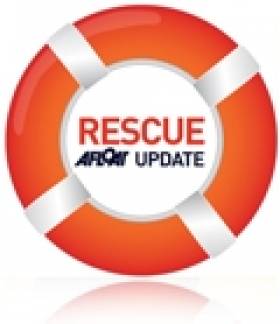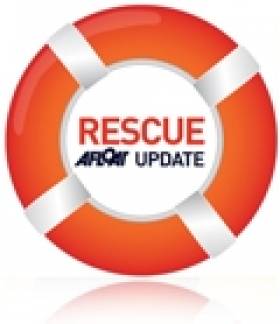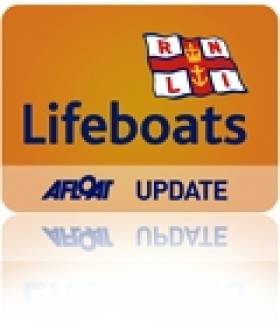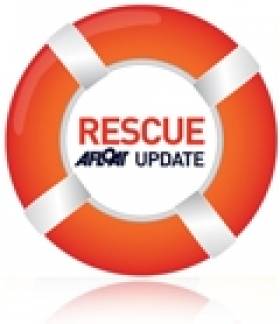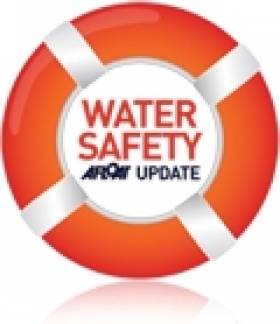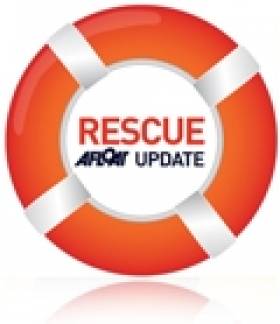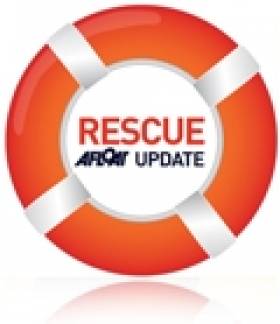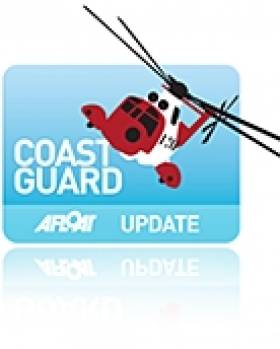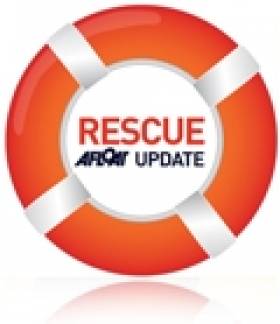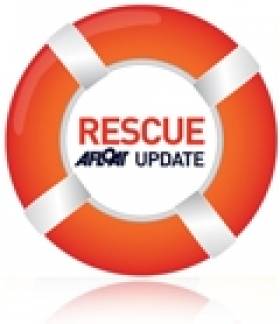Displaying items by tag: Rescue
Weekend Rescues at Lough Derg and Doolin
#RESCUE - Six people were rescued from a cruiser that ran aground in high winds on Lough Derg at the weekend.
The Irish Times reports that the group had been wakeboarding near Youghal Bay on Saturday afternoon when the 37ft boat's propeller fouled on the tow rope.
The crew attempted to free the propeller but the boat began drifting to the rocks in Force 7 gusts.
The Irish Coast Guard were quickly notified and put out a message for assistance to all vessels in the area while Lough Derg RNLI lifeboat responded to the scene, finding the cruiser on the rocks but not seriously damaged.
The boat was subsequently towed to Dromineer Bay. No injuries were reported.
Elsewhere, the Irish Coast Guard was called to assist a man who had been camping on an island bird sanctuary off Co Clare.
According to the Clare Herald, the harbourmaster at Doolin noticed the man camped on Crab Island, some 400 metres from the mainland, amid "extreme" sea conditions.
One of Ireland's worst drowning tragedies occurred in the same area in July 1983, when eight young men - including three brothers - drowned while swimming at Trá Leathan.
It's believed that the man made his way by kayak on Friday evening to the island - designated as a protected area due to the presence of a particular seabird species.
The Doolin coastguard unit made three trips to the island to retrieve the man and his belongings.
Telescope User Spots Injured Man Adrift in Cork Harbour
#RESCUE - The Evening Echo reports on the 'miracle rescue' of a man who fell from his boat in Cork Harbour after he was spotted by telescope.
The incident happened on Saturday, when the 37-year-old man from Carrigaline went overboard from a RIB near Haulbowline Island. It is understood that the man was struck by the RIB after he entered the water.
With no other boats in the area at the time, it was by a sheer stroke of luck that he was spotted from a mile away by a man looking out through a telescope at Fort Camden in Crosshaven.
A rescue effort was quickly mobilised, with the Cork Pilot boat and Crosshaven lifeboat both speeding to the scene.
The man, who was found seriously injured, was taken to the Crosshaven lifeboat station from where he was rushed to hospital.
An RNLI spokesperson said the man was "incredibly lucky to have been spotted from shore".
The injured man's family have since praised the telescope user, who is as yet unknown, for his quick thinking in ensuring the rescue of the father-of-two. The Evening Echo has more on the story HERE.
It's the second dramatic rescue in Cork in the past few weeks, coming after brave volunteers from the Baltimore RNLI halted a runaway RIB heading for a busy pier, as previously reported on Afloat.ie.
Children Rescued From Rising Tide in Galway Bay
#LIFEBOATS - Four children were rescued from a rising tide on Sunday in what was a busy June bank holiday weekend for Ireland's RNLI lifeboats.
The Irish Times reports that a 10-year-old and three teenagers were with their father on Rine Island in Galway Bay, near Ballyvaughan in Co Clare, when they were caught out by the incoming tide.
The father swam to shore and raised the alarm, promoting a quick response from an Irish Coast Guard helicopter and the Galway RNLI lifeboat, who removed the children to safety.
“Both rescue services pulled out all the stops and were on the scene within minutes to divert what could have been a tragedy," said Galway lifeboat operations manager Mike Swan.
The incident occurred not long after the Ballycotton lifeboat was called to assist a vessel taking on water some 23 miles southeast of the Co Cork town.
And elsewhere, as previously reported on Afloat.ie, two racing yachts were led to safety by the Dun Laoghaire lifeboat on Sunday morning after getting into difficulty amid gale-force winds and driving rain on Dublin Bay.
#RESCUE - Brave volunteers from the Baltimore RNLI saved the day when they jumped aboard a runaway speedboat heading for a busy pier last Friday.
As the Irish Examiner reports, it was one of four dramatic rescues made by the West Cork lifeboat crew in a single 24-hour period.
Pat Collins and Tadhg Collins were the plucky duo who attempted the daring feat from their inflatable boarding boat launched from the all-weather lifeboat.
They manoeuvred their boat close enough to the runaway RIB - which was circling at speeds of up to 20 knots ever closer to the pier after its pilot and passenger were thrown overboard - to allow Tadgh to leap on board and turn down the engines.
The RIB's crew were unharmed in the incident, swimming away and finding shelter on a ketch anchored at Sherkin Island.
Baltimore's busy 24 hours continued with call-outs from three yachts during Saturday's force 7 easterly winds.
The Irish Examiner has more on the story HERE.
#SAFETY– Warmer weather has turned many waterways into a playground for aquatic sports and boating activities. Accidents can happen fast on water and there may not be time to reach for a lifejacket in an emergency therefore don't just carry a lifejacket - wear it; if it's not on you, it can't save your life. That's the pressing message of a Bank Holiday campaign from Irish Water Safety, which is urging people to make sure that their lifejackets are in good order for the summer season ahead.
Of great concern is the fact that parents continue to bring children boating without ensuring that all on board wear a lifejacket. Warmer weather is enticing many to enjoy leisure boating activities nationwide and as this is National Water Safety Awareness Week, Irish Water Safety is advising all boat users to study its safe boating alert so that safety comes before complacency when boating.
Irish Water Safety's Safe Boating Alert:
Check condition of boat and equipment, hull, engine, fuel, tools, torch.
Check the weather forecast for the area.
Check locally concerning dangerous currents, strong tides etc.
Do not drink alcohol while setting out or during your trip.
Carry an alternative means of propulsion e.g. sails and oars or motor and oars.
Carry a first aid kit on board and distress signals (at least two parachute distress rockets, two red hand flares).
Carry a fire extinguisher, a hand bailer or bucket with lanyard and an anchor with rope attached.
Carry marine radio or some means of communication with shore.
Do not overload the boat - this will make it unstable.
Do not set out unless accompanied by an experienced person.
Leave details of your planned trip with someone ashore - including departure and arrival times, description of boat, names of persons on board, etc.
Wear a Lifejacket or Personal Flotation Device at all times.
Keep an eye on the weather - seek shelter in good time.
In Marine Emergencies, call 999 or 112 and ask for Marine Rescue.
Lifejackets Checklist
Visually Check all lifejackets and buoyancy aids for the following deficiencies:
Ensure CO2 Cartridges have not been punctured and are secured firmly
Ensure all zips, buckles, fasteners and webbing straps are functioning correctly and adjusted to fit the user
Check that their lights, if fitted are operating correctly
Ensure that Automatic Inflation devices if fitted are fully serviced and in date
Check that the valve or lifejacket is not leaking by inflating the lifejacket overnight
Missing Divers Rescued by Dun Laoghaire Lifeboat
#RESCUE - Two divers reported missing in Dublin Bay this morning have been rescued by the RNLI lifeboat from Dun Laoghaire.
The pair had been with a group diving off the Muglins Rock, close to Dalkey Island, but did not return to the surface as planned around 11.30am on Sunday 27 May.
The dive-boat coxswain alerted the Irish Coast Guard's Marine Rescue Co-Ordination Centre (MRCC) in Dublin which requested the RNLI all-eather lifeboat launch to assist.
Also responding were the Naval Service vessel LE Aoife, the Irish Coast Guard's rescue helicopter from Dublin Airport and the Dun Laoghaire coastguard unit.
Some 30 minutes after the initial call, the lifeboat spotted the two casualties together on the surface. The divers had been swept a mile-and-a-half north of the original dive site by the incoming tide.
One of the lifeboat crew entered the water to assist with their equipment and air tanks before both were taken on board the lifeboat and brought to shore. Neither was injured in the incident.
"This incident could easily have been a tragedy," said Stephen Wynne, RNLI lifeboat operations manager at Dun Laoghaire. "Fortunately the correct procedure was followed in raising the alarm early enough."
Two Rescued from Cruiser on 'Enraged' Lough Derg
#RESCUE - The Irish Times reports that two people were rescued from a cruiser that ran aground in an "enraged" Lough Derg on Sunday afternoon.
Eyewitnesses on the shore at Terryglass in Co Tipperary raised the alarm after spotting the duo in distress when their boat lost power amid force 8 gales.
The Lough Derg RNLI lifeboat was dispatched but stood down on news that both persons on board the cruiser had been taken to shore by another boat in the area responding to a radio alert by the Irish Coast Guard.
Coastguard Rescues Three Men from Angling Boat
#RESCUE – Three men were rescued from an angling boat they had just bought when it broke down in the Menai Strait.
Holyhead Coastguard received a 999 phone call from one of the men on board the 28 foot boat at just after midnight today. He explained that the engine had cut out and they were drifting towards rocks.
Because the crew weren't sure exactly where they were Penmon, Bangor and Llandwrog Coastguard Rescue Team were sent to the area. The RNLI inshore lifeboat from Beaumaris and the All weather lifeboat from Porthdinllaen were asked to attend alongside the RAF rescue helicopter from Valley. Using the blue flashing lights from Coastguard vehicles Holyhead Coastguard were able to establish their exact location. The crew were lifted to safety and taken to hospital by the rescue helicopter. The Beaumaris lifeboat towed their vessel ashore to Caernarfon.
Barry Priddis Holyhead Watch Manager said:
"This crew had recently bought to boat but what they hadn't acquired were waterproof clothing, lifejackets, flares or training in how to use a vhf radio. They also had no way of knowing where they were.
"Luckily there were in sight of land when the engine failed so they were able to make a mobile phone call but a fun fishing trip could easily have turned to tragedy.
"If you are buying a boat please think about the other equipment you'll need. We recommend that you wear a lifejacket at all times when on deck. These should be well maintained and have a sprayhood, light and whistle. You should also have DSC or vhf radio communications and know how to use it."
Heart Attack Passenger Airlifted from Cruise Liner
#RESCUE - A cruise passenger en route from Ireland to France has been airlifted to hospital by Royal Navy rescue helicopter, according to BBC News.
RNAS Culdrose in Cornwall yesterday dispatched its long-range rescue chopper to retrieve the 83-year-old man who suffered a heart attack on board the cruise liner Marco Polo, which recently left port in Cork.
The airlift was described as "tricky" due to the storm-force weather conditions at sea some 100 miles from the Cornish coast.
Both the man and his wife were transpored to the Royal Cornwall Hospital in Truro for treatment. There is as yet no news as to his condition.
#RESCUE - The Galway Independent reports that two men were rescued by the Galway RNLI lifeboat on Sunday when their boat got into difficulties in Galway Bay.
The yacht was crossing from Barna to Spiddal when it suffered and engine failure and began to drift in the stormy weather conditions that have battered the west coast in recent days.
Lifeboat volunteers were notified by the Irish Coast Guard and located the 22-ft yacht two miles from Barna. Both crew and boat were returned to their home port, and no injuries were reported.



























